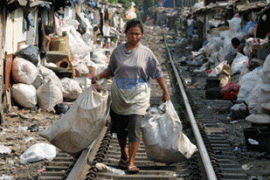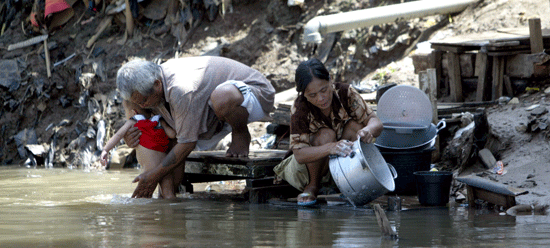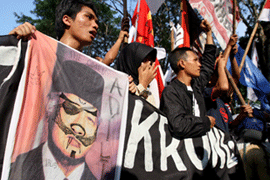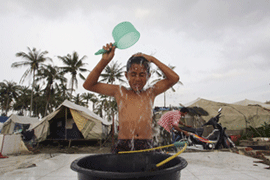Telling Indonesia’s story
Correspondent Step Vaessen looks back at a decade of reporting from Indonesia.

 |
| Life for millions of Indonesia’s poor is simply a struggle to survive [EPA] |
Step Vaessen, Al Jazeera’s Jakarta correspondent, looks at the changes she has seen over more than a decade reporting from across Indonesia.
“We have become a country of demonstrations,” my driver said angrily when we were stuck in traffic again. Ten years after the fall of Suharto the “rakyat kecil” – the common people of Indonesia – see democracy mostly as an annoying disturbance of public life.
“Democracy is only for rich people,” a rickshaw driver explained to me recently.
Hopes were very high in 1998. I had arrived in Jakarta a year earlier when Suharto, the then president, still seemed fully in control.
Sense of change
My bosses at the national broadcaster in the Netherlands then wondered why I so desperately wanted to go to Indonesia. No major news story had come out of the country for more than 30 years.
| In depth |
But I sensed an unstoppable hunger for change, although still very well hidden.
A few weeks after my arrival, Asia was plunged into a major financial crisis. Within days the Indonesian currency, the rupiah, was only worth a fraction of its previous value.
Fires destroyed an enormous part of Indonesia‘s forests. The lungs of the world were burning. Covered in smoke, Indonesia made its entry on the world news map.
Within eight months I had been arrested twice for covering a story. The second time the authorities decided it was time for me to leave. It was March 1998 and, fuelled by the financial crisis, protests against Suharto were gathering steam.
I decided to stay in the region.
On May 12, while travelling in neighbouring Malaysia, I received a phone call from a student friend.
“You have to come back now,” my friend said. “They are killing us.”
 |
| Public discontent continues to erupt into sometimes violent protests [GALLO/GETTY] |
Four students had been shot by the army while demonstrating in front of their campus. I knew this could be the trigger.
Posing as a tourist, carrying a travel guide, I took a boat from Singapore to Indonesia. I knew they would not have a computer with my name in it at the port of arrival.
Shopping malls were burning with hundreds of bodies inside, Chinese women were being raped, students occupied the parliament building. Indonesia was out of control.
The question was not if but when Suharto would finally step down.
In the following days a fascinating political power play evolved behind the scenes. By May 21 the pressure had become too much, most of his allies had jumped ship and the “smiling general” decided it was time to quit.
I called my friend who was a close adviser to Suharto’s successor, BJ Habibie, telling her I had re-entered the country and wanted to work in Indonesia again.
It took four more months, but I was officially allowed back in – part of the new democratic Indonesia.
People’s resilience
The honeymoon did not last long. Students continued to protest against the government who they thought was too closely linked to the previous regime.
Communal and religious riots broke out in different parts of the country.
Speculation was rife that the unity of Indonesia was at stake.
 |
|
The legacy of abuses from the Suharto era |
The country of 230 million with so many cultures and religions, known for its tolerance, was falling apart.
For millions, daily life had become a simple struggle to survive. Democracy did not automatically attract much-needed investors. Corruption became even more widespread.
Bureaucrats had learnt the tricks of the previous government and were not afraid of their bosses anymore.
“Bribery used to happen under the table, now they steal the whole table,” people joked.
Many times I have wondered when poor Indonesians would start to revolt. But they never did. With remarkable strength and survival instincts they managed to muddle through.
Meanwhile the middle class and elite were enjoying their new found freedom. Journalists could finally do their job, except when they wanted to travel to conflict areas.
Even now foreign journalists need a special permit to travel to Papua, Indonesia‘s eastern-most province which has seen a decades-long struggle for an independent state.
But the biggest change of all is that the fear has gone. People are not afraid to voice their opinion anymore.
As a journalist I can travel across the country and record an interview with a fisherman or a rice farmer and they no longer have to look over their shoulder anymore to see if someone is listening.
For a correspondent, Indonesia is one of the most fascinating places to report from. It is not just a country, but a whole continent. Fly a few hours from Jakarta and you end up in a different world.
 |
| The 2004 tsunami tested Indonesia to its limits [GALLO/GETTY] |
After the first six years in Indonesia I witnessed the rise and fall of five different presidents.
Election day is called the festival of democracy and Indonesians like to have a choice.
Over the years different governments have managed to bring peace to some of the country’s most troubled regions and some sort of stability to the country.
Their largest omission though is the lack of justice and accountability.
Former generals behind bloody violence in East Timor, Aceh, Ambon and other parts of the country were never punished for their deeds – not a good message to pass on to future generations.
But when political upheaval calmed, nature started to rear its head.
In late 2004 I found myself covering one of the world’s largest natural disasters just on my doorstep.
Surrounded by dead bodies after the massive tsunami in Aceh I wondered again if survivors would ever recover. But despite the overwhelming devastation they managed to do it.
In more than a decade reporting from their country, Indonesians have taught me many things. But most importantly they have shown me an uncompromising strength to survive.
